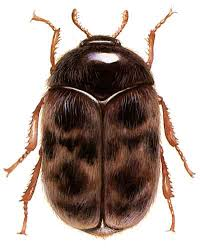Do you import PLANT PRODUCTS from a Khapra beetle Country see list below ?
Khapra beetle (Trogoderma granarium) is a destructive pest that can reproduce rapidly in stored products under hot conditions and is a significant biosecurity risk to Australia.
Khapra beetle is found throughout Asia, Africa, the Middle East and Europe. The department has identified the following countries as those where khapra beetle is present:
- Afghanistan
- Albania
- Algeria
- Bangladesh
- Benin
- Burkina Faso
- Côte d’Ivoire (Ivory Coast)
- Cyprus
- Egypt
- Ghana
- Greece
- India
- Iran, Islamic Republic of
- Iraq
- Israel
- Kuwait
- Lebanon
- Libya
- Mali
- Mauritania
- Morocco
- Myanmar
- Nepal
- Niger
- Nigeria
- Oman
- Pakistan
- Qatar
- Saudi Arabia
- Senegal
- Somalia
- South Sudan
- Sri Lanka
- Sudan
- Syrian Arab Republic
- Timor-Leste
- Tunisia
- Turkey
- United Arab Emirates
- Yemen
Are these goods High risk plant products ?
|
Product |
Tariff item code |
|
Rice (Oryza sativa) |
1209, 1006 |
|
Chickpeas (Cicer arietinum) |
1209, 0713, 1106 |
|
Cucurbit seed (Cucurbita, Cucumis, Citrullus spp.) |
1209, 1207 |
|
Cumin seed (Cuminum cyminum) |
1209, 0909 |
|
Safflower seed (Carthamus tinctorius) |
1209, 1207 |
|
Bean seed (Phaseolus spp.) |
1209, 0713, 1106 |
|
Soybean (Glycine max) |
1209, 1201 |
|
Mung beans, cowpeas (Vigna spp.) |
1209, 0713, 1106 |
|
Lentils (Lens culinaris) |
1209, 0713, 1106 |
|
Wheat (Triticum aestivum) |
1209, 1001, 1104, 1103, 1101 |
|
Coriander seed (Coriandrum sativum) |
1209, 0909 |
|
Celery seed (Apium graveolens) |
1209 |
|
Peanuts (Arachis hypogaea) |
1209, 1202, 0713, 1106 |
|
Dried chillies/capsicum (Capsicum spp.) |
09 |
|
Faba bean (Vicia faba) |
1209, 0713, 1106 |
|
Pigeon Pea (Cajanus cajan) |
1209, 0713, 1106 |
|
Pea seed (Pisum sativum) |
1209, 0713, 1106 |
|
Fennel seed (Foeniculum spp). |
1209, 0909 |
The following exclusions apply:
- goods that are thermally processed that are commercially manufactured and packaged such as retorted, blanched, roasted, fried, par-boiled, boiled, puffed, malted or pasteurised goods
- goods that are chemically processed and preserved such as with a Formalin Propionic Acid fixative, Formalin Acetic acid alcohol, Carnoy’s fixative or ethanol.
- fresh vegetables
- commercially manufactured frozen or freeze-dried food (perishable foodstuffs only)
- frozen plant samples for plant research (including through the use of liquid nitrogen and freeze drying)
- oils derived from vegetables or seed
- Preserved or pickled (such as in vinegar or alcohol)
- goods that have been refined or extracted to obtain specific components from plant-based raw materials. Examples include starch, lecithin, protein, cellulose, sugars and pigments.
Are these goods other risk Plant products ?
- Seeds (all species, excluding those listed as high-risk plant products)
- Spices (all species, excluding those listed in high-risk plant products)
- Plant gums and resins (except those chemically extracted or highly processed)
- Meals and flours of plant origin (all species, excluding those listed in high-risk plant products)
- Dried fruits
- Nuts (all species, excluding those listed in high-risk plant products)
- Dried vegetables
- Unprocessed plant products (excluding fresh fruits, vegetables, nursery stock, herbarium specimens, fresh cut flowers).
The following exclusions apply:
- goods that are thermally processed that are commercially manufactured and packaged such as retorted, blanched, roasted, fried, par-boiled, boiled, puffed, malted or pasteurised goods
- goods that are chemically processed and preserved such as with a Formalin Propionic Acid fixative, Formalin Acetic acid alcohol, Carnoy’s fixative or ethanol.
- fresh vegetables
- commercially manufactured frozen or freeze-dried food (perishable foodstuffs only)
- frozen plant samples for plant research (including through the use of liquid nitrogen and freeze drying)
- oils derived from vegetables or seed
- Preserved or pickled (such as in vinegar or alcohol)
- goods that have been refined or extracted to obtain specific components from plant-based raw materials. Examples include starch, lecithin, protein, cellulose, sugars and pigments.
Is the final delivery of goods going to a Rural Grain growing Area ?
If you have answered yes to any of these questions then you goods are subject to MANDATORY TREATMENT PRIOR TO SHIPMENT
Treatment options and rates for plant products
In cases where treatment is required for plant products (refer to Phase 3 and 4 of the urgent actions), one of the approved treatment options listed below must be used.
Methyl Bromide Fumigation
The goods must be fumigated with a dose of 80 g/m³ or above, at 21°C or above, for a minimum of 48 hours. The fumigation must be conducted in accordance with the Methyl Bromide Fumigation Methodology, including end-point retention and dose compensation requirements.
Heat Treatment
The goods must be heat treated at 60°C or higher (measured at the core of the goods) for a minimum of 120 minutes. The treatment must be conducted in accordance with the Heat Treatment Methodology.
For further information please see below link
https://www.agriculture.gov.au/pests-diseases-weeds/plant/khapra-beetle/sea-container-measures
Attachment(s):

